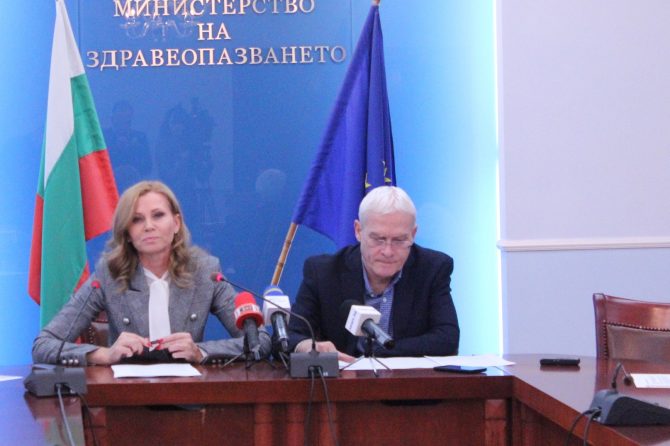
Share of People Declaring Willingness to Become Donors or Give Consent for a Loved One Significantly Increased as a Result from the “Yes to Life!” Campaign
In the month and a half since the “Yes to Life!” campaign launched, 50,000 donor cards were given out. Thanks to them and the tireless and consistent work of our partners from the Bulgarian Red Cross, out media partners, doctors, transplant specialists, medical coordinators, all of whom made time to promote the campaign, the idea of organ donation and transplantation “entered” many Bulgarian homes. Our goal was to raise public awareness about the meaning and significance of organ donation and transplantation, and today I am happy to say that we made the first successful step. I would also like to thank the high-profile individuals who did not hesitate in lending their support, all organisations that provided assistance the entire way, and the not insignificant number of transplanted patients who embraced the cause by telling their personal stories and did their best to make more people accept it as their own. This was a part of Deputy Minister of Health Svetlana Yordanova’s speech during the closing ceremony for the National Campaign to promote awareness about organ donation and transplantation “Yes to Life!”.
The Deputy Minister stated that due to the enormous public demand for donor cards and their added value for raining public awareness on the issue, the Ministry has planned a new print run of 25,000 cards, part of which will be distributed to the regional organisations of the Bulgarian Red Cross. In addition, people who want a donor card can write to the Ministry (addressing their letter to Directorate Public Relations at 5 Sveta Nedelya square, Sofia 1000) or send an email to donorskakarta@mh.government.bg. Each person can order up to two donor cards which will be sent by post. The recipient’s address and the city or town’s postal code should be included in the request.
During the active campaigning period, when the “Yes to Life” donor cards were being given out, the share of people who declared willingness to become organ donors increased significantly; including by donating their own organs (from 35% to 51%) and giving consent for loved ones (from 32% to 46%). The change was especially pronounced among people who were aware of the campaign – 72.4% of them declared consent to donate, versus 37.1% of people who did not know about it. These figures were part of the public opinion report on the “Yes to Life” campaign presented by Boryana Dimitrova from the Alpha Research polling agency. The poll showed that two out of three people who were more or less acquainted with the campaign say that it raised their awareness on the issue and that they learned more about organ donation.
The campaign provoked more conversation and discussions on the matter – among friends, but mostly in families (from 12% to 26%). The latter is especially significant, as experience from a number of European countries show that it is family discussions and communicating one’s decision about becoming an organ donor to one’s loved ones is a key factor for increasing the rate of informed consent for organ donation, Boryana Dimitrova said.
The comprehensive analysis of the data shows that the campaign changed attitudes towards organ donation in a positive way. The first step was successful, but to achieve lasting change, not just in attitudes but in people’s decision-making and behaviour, we need to keep up the discourse, information campaigning and practical initiatives.
The current Law on Transplantation of Organs, Tissues and Cells has been in force for 14 years, but this is the first planned, organised and targeted information campaign on the issue. The sporadic events we’ve had over the years failed to influence public opinion. With the “Yes to Life!” campaign we successfully raised awareness about organ donation and transplantation, explained Petko Salchev, deputy director of Executive Agency “Medical Supervision”.
Deputy Minister of Health Svetlana Yordanova commented on the National Programme to Promote Organ Donation and Support Transplantation in the Republic of Bulgaria 2019–2023. The objective of the Programme is to improve the organisational model of organ donation and transplantation in Bulgaria and reduce the disproportion between the demand for organs and their supply. The main strategies for improving donation and transplantation activity include involving major healthcare facilities in the transplantation process system and developing logistic plans for transfers to a donation or transplantation centre for smaller healthcare facilities; introducing an evaluation and donor conditioning programme; training for physicians; performance control; reporting and analysis of the results to improve the current model, etc. A National Coordination Council will be established to ensure effective management and coordination of the National Programme.
A national donation coordinator, six regional coordinators and up to 30 local coordinators will be appointed in execution of the Programme, up to three of which will operate in the city of Sofia, the Deputy Minister announced.
In addition, the responsibility to organise the process of identifying, maintaining and providing potential donors who have been declared brain dead will be expressly written in the management contracts of executive directors of healthcare facilities where donations are performed. In terms of the process of identification of a potential donor, the procedures for potential donor evaluation will be updated; new mechanisms facilitating organ donor identification will be developed and new equipment will be purchased.
To engage public attention on the issue of donation, there will be annual information campaigns; there are plans to introduce the matter in secondary education, as well as to incorporate the fields of organ donation and transplantation in the curricula of medical universities in Bulgaria.
You can read the Alpha Research opinion poll results here.
Leave a reply